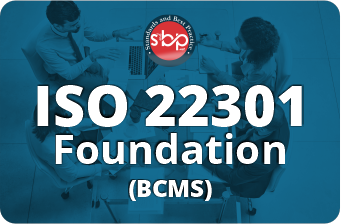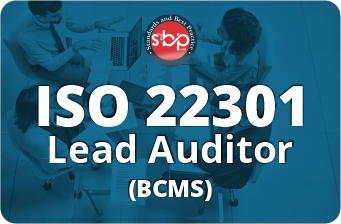ISO/IEC 22301:2019 - BUSINESS CONTINUITY MANAGEMENT SYSTEM
- Home
- Certifications
- ISO 22301:2019 - Business Continuity Management System (BCMS)
Description
Incidents can disrupt an organization at any time and applying ISO 22301 will ensure that organizations can respond and continue its operations. Incidents take many forms ranging from large scale natural disasters and acts of terror to technology-related accidents and environmental incidents. However, most incidents are small but can have a significant impact and that makes business continuity management relevant at all times. This has led to a global awareness that organizations in the public and private sectors must know how to prepare for and respond to unexpected and disruptive incidents.
ISO 22301 enables you to respond effectively and promptly based on the procedures that apply before, during and after the event. Implementing a Business Continuity plan within your organization means that you are prepared for the unexpected. Business Continuity Plan assures you that your organization will continue to operate without any major impacts and losses.
Benefits of ISO 22301 Certification
- Expand your knowledge on how a Business Continuity Management System will help you to meet business objectives.
- Gain the necessary knowledge to manage a team in the implementation of ISO 22301.
- Strengthen your reputation management.
- Improve the recovery time.
- Gain Global recognition
-
ISO 22301 Foundation (FD):
This training course is designed to help participants understand the fundamental concepts and principles of a business continuity management system (BCMS) based on ISO 22301. By attending this training course, participants will learn more about the structure and requirements of the standard including the BCMS policy, the top management’s commitment, internal audit, management review, and continual improvement process.
After completing this course, participants can sit for the exam. Once participants meet the pass mark, he/she will be given a “SandBP Certified ISO 22301 Foundation” credential. A SandBP Foundation Certificate shows that the participants have understood the fundamental methodologies, requirements, framework and management approach.
-
ISO 222301 Lead Implementer (LI):
Organizations can make progress towards understanding and managing disasters, incidents, and risks by having a BCMS based on ISO 22301 in place. Therefore, SandBP has designed this training course to prepare its participants implement a business continuity management system (BCMS) in compliance with the requirements of ISO 22301.
Attending this training course allows you to gain a comprehensive understanding of the best practices of the business continuity management system and to be able to establish a framework that allows the organization to continue operating efficiently during disruptive events.
After mastering all the necessary concepts of Business Continuity Management Systems, participants can sit for the exam. Once participants meet the pass mark, he/she will be given “SandBP Certified ISO 22301 Lead Implementer” credential. By holding a SandBP Lead Implementer Certificate, the participant can be able to demonstrate that he/she has the practical knowledge and professional capabilities to implement ISO 22301 in an organization.
- Introduction to Business Continuity Management (BCM)
- Understanding ISO 22301
- Context of the Organization in Business Continuity Management
- Leadership and Governance in BCM
- Risk Assessment and Business Impact Analysis (BIA)
- Business Continuity Strategy and Planning
- Implementation and Operation
- Performance Evaluation and Monitoring
- Integration with other Management Systems
- Crisis Management and Response
- Business Continuity Culture and Communication
- Certification and Compliance
- Certification Exam
-
PRE-REQUISITE: A fundamental understanding of ISO 22301 and comprehensive
knowledge of implementation principles.
ISO 22301 Lead Auditor (LA):
Recognizing the importance of an effective audit and the means used to successfully conduct it, SandBP has designed the ISO 22301 Lead Auditor training course. Attending this training course allows you to obtain the knowledge and skills to plan and carry out audits in compliance with ISO 19011 and the certification process according to ISO/IEC 17021-1.
Through interactive sessions, explanatory information, exercises, and questions for discussion, you will be able to acquire knowledge on the business continuity management system as well as audit techniques and become competent to perform a BCMS audit by applying widely recognized audit principles, procedures, and techniques, and to manage an audit program and an audit team.
After acquiring the necessary expertise to perform this audit, participants can sit for the exam. Once participants meet the pass mark, he/she will be given a “SandBP Certified ISO 22301 Lead Audit” credential. By holding a SandBP Lead Auditor Certificate, the participant can be able to demonstrate that he/she has the practical knowledge and professional capabilities to audit ISO 22301 in an organization.
Certification
- Candidates who score 70% and above in the examination will be issued an SANDBP certificate.
- In case you do not meet the pass mark, you can retake the exam for FREE after the first attempt while subsequent retakes would come at a cost.
Criteria for Suspending and Withdrawing the Scope of Certification
SANDBP reserves the right to suspend or revoke certifications for reasons including fraud, deceit, or submission of inaccurate data.
Process:
- Certificate holders will be notified by certified mail if evidence of charges is found.
- They may present their defense in writing to the certification board.
- The board will review the case and decide to uphold or deny the suspension/revocation.
Causes for Suspension/Withdrawal:
- Improper use of certificates/logos
- Malpractices
- Providing false information
- Ineligibility for applied examinations
- Voluntary suspension requests
Recertification Process
Recertification ensures that certified individuals maintain their knowledge and skills in line with the latest standards and practices. It is a critical process that reaffirms the competency of certified professionals, allowing them to stay current with evolving industry standards.
Criteria for Recertification:
-
Transition Exam:
* Individuals must take and pass a transition exam when there is a change in the current version of the certification standard.
* The transition exam focuses on the updates and changes in the new version of the standard, ensuring that certified individuals are knowledgeable about the latest requirements and practices. -
Adherence to Code of Ethics:
Certified individuals must adhere to a code of ethics, demonstrating professionalism and integrity in their practice. Any violations of the code of ethics may result in the suspension or revocation of certification
-
Payment of Recertification Fees:
Payment of the required recertification fees is necessary to process and validate the renewal of certification.
Introduction
To maintain the integrity and fairness of our examinations, specific guidelines have been established for proctoring. These rules apply to all candidates and must be adhered to strictly. Failure to comply may result in disqualification or other disciplinary actions.
General Requirements
Technology Setup
- Device: Use a desktop or laptop with a working webcam and microphone. Mobile phones or tablets are not permitted unless explicitly allowed.
- Internet: Ensure a stable internet connection with sufficient bandwidth to stream video and audio continuously.
- Browser: Use the designated browser as specified by the exam platform.
- Power Backup: Ensure your device is fully charged and/or connected to a reliable power source.
Environmental Setup
- Location: Choose a quiet, well-lit room with minimal distractions.
- Background: Ensure the background is plain and free of any clutter or distractions.
- Privacy: No other person is allowed in the room during the examination.
Pre-Exam Procedures
Present a valid government-issued photo ID or institution-approved identification document. Ensure that no unauthorized materials (e.g., books, notes, or electronic devices) are present.
During the Exam
Behavior Guideline
- Focus on the Screen: Avoid looking away from the screen for extended periods.
- No Assistance: You are prohibited from receiving help from anyone or any external resource.
Prohibited Items
- Electronic devices such as mobile phones, tablets, smartwatches, and earphones.
- Books, notes, or any other study material unless explicitly permitted.
Proctor Interaction
- Follow all instructions given by the proctor.
- If contacted for clarification or rule enforcement, respond promptly and cooperatively.
- Inform the proctor immediately in case of technical issues.
Post-Exam Procedures
Submission
- Ensure your exam responses are submitted within the designated time.
- Do not close the exam window or disconnect until you receive confirmation that your submission is successful.
Feedback
- Report any technical issues or concerns to the designated support team immediately aƜer the exam.
Violations and Consequences
Examples of Violations
- Using unauthorized materials or devices.
- Attempting to impersonate another candidate.
- Engaging in suspicious behavior (e.g., frequent movement, talking).
- Disconnecting intentionally without justification.
Consequences
- Warnings for minor infractions.
- Disqualification of the exam attempt for major violations.


